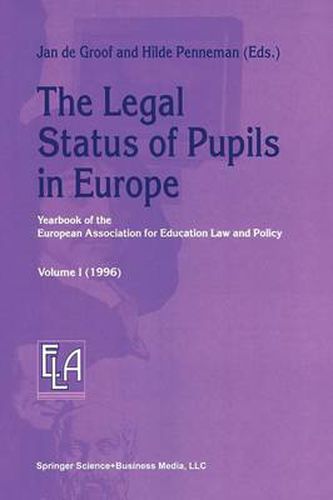Readings Newsletter
Become a Readings Member to make your shopping experience even easier.
Sign in or sign up for free!
You’re not far away from qualifying for FREE standard shipping within Australia
You’ve qualified for FREE standard shipping within Australia
The cart is loading…






This title is printed to order. This book may have been self-published. If so, we cannot guarantee the quality of the content. In the main most books will have gone through the editing process however some may not. We therefore suggest that you be aware of this before ordering this book. If in doubt check either the author or publisher’s details as we are unable to accept any returns unless they are faulty. Please contact us if you have any questions.
In the centre of the whole educational cosmos stands the pupil, the student. He or she has rights, sanctioned by a national and international judicial apparatus. The freedoms of parents, teachers and education establishments are functional in the service of the rights of the user of education , as is the government’s assignment. They hold a joint responsibility with regard to the right of a young person to be educated, and a fortiori of the school-age young person. The context in which education takes place is nevertheless undergoing major change. In recent times, schools have been presenting themselves more as brittle social institutions, sensitive to internal and external conflicts. If every education establishment is a crossroads of legal relationships, this does not leave the pupil or student untouched. He or she can seek recourse to fundamental rights; but against these can be set certain obligations - and in the first place the obligation to take account of the rights of fellow pupils and students. Educational sociologists have for some time been interested in the rela tionship between the behaviour of pupils and the quality and effectiveness of the school. I Practitioners of law in general, and education law in particular, could not ignore the legal status of the education user. It immediately became apparent how interwoven education is with a diversity of disciplines within the legal domain, as well as with other scientific disciplines.
$9.00 standard shipping within Australia
FREE standard shipping within Australia for orders over $100.00
Express & International shipping calculated at checkout
Stock availability can be subject to change without notice. We recommend calling the shop or contacting our online team to check availability of low stock items. Please see our Shopping Online page for more details.
This title is printed to order. This book may have been self-published. If so, we cannot guarantee the quality of the content. In the main most books will have gone through the editing process however some may not. We therefore suggest that you be aware of this before ordering this book. If in doubt check either the author or publisher’s details as we are unable to accept any returns unless they are faulty. Please contact us if you have any questions.
In the centre of the whole educational cosmos stands the pupil, the student. He or she has rights, sanctioned by a national and international judicial apparatus. The freedoms of parents, teachers and education establishments are functional in the service of the rights of the user of education , as is the government’s assignment. They hold a joint responsibility with regard to the right of a young person to be educated, and a fortiori of the school-age young person. The context in which education takes place is nevertheless undergoing major change. In recent times, schools have been presenting themselves more as brittle social institutions, sensitive to internal and external conflicts. If every education establishment is a crossroads of legal relationships, this does not leave the pupil or student untouched. He or she can seek recourse to fundamental rights; but against these can be set certain obligations - and in the first place the obligation to take account of the rights of fellow pupils and students. Educational sociologists have for some time been interested in the rela tionship between the behaviour of pupils and the quality and effectiveness of the school. I Practitioners of law in general, and education law in particular, could not ignore the legal status of the education user. It immediately became apparent how interwoven education is with a diversity of disciplines within the legal domain, as well as with other scientific disciplines.